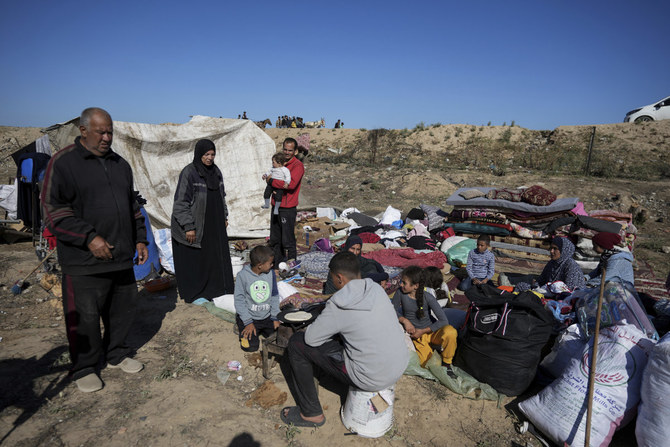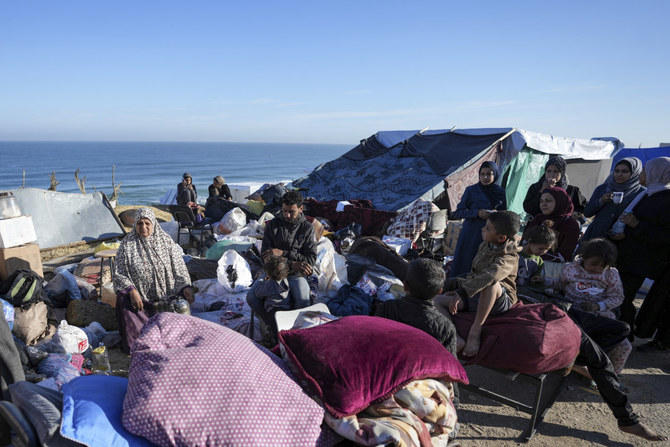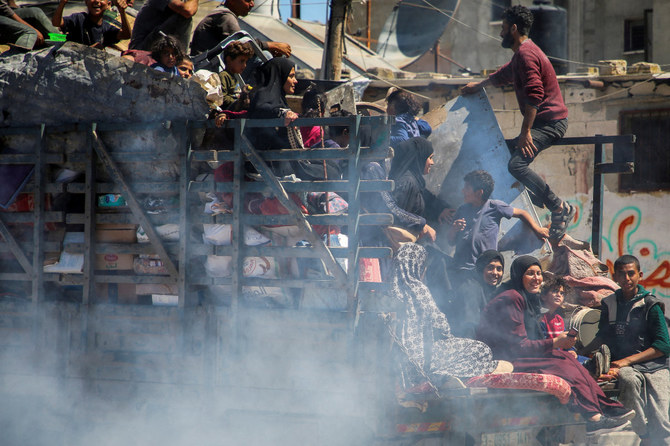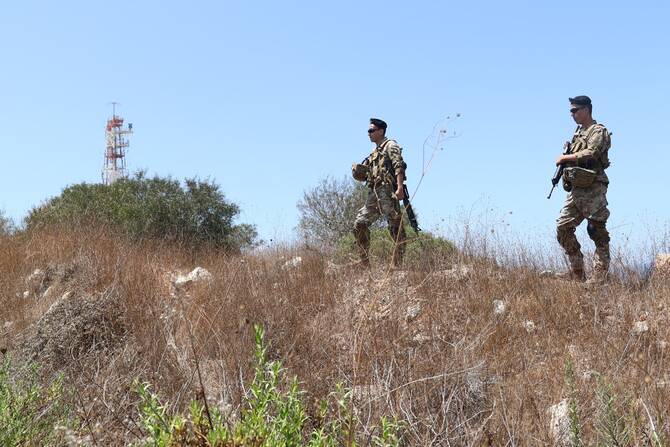RAFAH, Gaza Strip: The United Nations agency supporting Palestinian refugees said Thursday that about 80,000 people had fled Rafah in the three days since Israel intensified military operations in the south Gaza city.
“Since Israeli forces military operation intensified on 6 May, around 80,000 people have fled Rafah, seeking refuge elsewhere,” UNRWA said on X, formerly Twitter, warning that “the toll on these families is unbearable. Nowhere is safe.”
The main hospital has shut down, leaving little care for people suffering from malnutrition, illnesses and wounds.
And with fuel and other supplies cut off, aid workers have been scrambling to help a population desperate after seven months of war.
As the possibility of a full-scale invasion looms, Gaza’s overcrowded southernmost city has been thrown into panic and chaos by Israel’s seizure of the nearby border crossing with Egypt.
Families uprooted multiple times by the war were uncertain where to go: to the half-destroyed city of Khan Younis, to points even farther north, or to an Israeli-declared “humanitarian zone” in Gaza already teeming with people with little water or supplies?
The past three days, streams of people on foot or in vehicles have jammed the roads out of Rafah in a confused evacuation, their belongings piled high in cars, trucks and donkey carts. All the while, Israeli bombardment has boomed and raised palls of smoke.
“The war has caught up with us even in schools. There is no safe place at all,” said Nuzhat Jarjer. Her family packed on Wednesday to leave a UN school-turned-shelter in Rafah that was rapidly emptying of the hundreds who had lived there for months.
Rafah had 250,000 residents before the war. Its population had ballooned to some 1.4 million as people from across Gaza fled there. Nearly every empty space was blanketed with tent camps, and families crammed into schools or homes with relatives. Like the rest of Gaza’s population, they have been largely reliant on aid groups for food and other basics of life.
Israel on Monday issued evacuation orders for eastern parts of the city, home to some 100,000. It then sent tanks to seize the nearby Rafah crossing with Egypt, shutting it down.

Israeli army tanks take position in southern Israel near the border with the Gaza Strip on May 7, 2024, ahead of an offensive. (AFP)
It remains uncertain whether Israel will launch an all-out invasion of Rafah as international efforts continue for a ceasefire. Israel has said an assault on Rafah is crucial to its goal of destroying Hamas after the militant group’s Oct. 7 attack on southern Israel that left 1,200 dead and 250 as hostages in Gaza.
The United States, which opposes a Rafah invasion, has said Israel has not provided a credible plan for evacuating and protecting civilians. The war has killed over 34,800 Palestinians, according to Gaza health officials, and has driven some 80 percent of Gaza’s population of 2.3 million Palestinians from their homes.
For now, confusion has reigned. Fearing a greater assault, Palestinians fled districts other than the eastern areas they were ordered to leave. Tens of thousands are estimated to have left, according to a UN official who spoke on condition of anonymity because agencies were still trying to determine precise figures.
Tent camps in some parts of Rafah have vanished, springing up again further north along main roads. New camps have filled streets, cemeteries and the beach in the central Gaza town of Deir Al-Balah, 15 kilometers (10 miles) north, as people flowed in, said Ghada Alhaddad, who works there with the aid group Oxfam, speaking to a briefing by several humanitarian workers.

Displaced Palestinians arrive in central Gaza after fleeing from the southern Gaza city of Rafah in Deir al Balah, Gaza Strip, on May 7, 2024. (AP)
Others made their way to Khan Younis, much of which was destroyed in a months-long Israeli ground assault.
Suze van Meegen, head of operations for the Norwegian Refugee Council in Palestine, said the Rafah district where she is based “feels like a ghost town.”
The Israeli military told those evacuating to go to a “humanitarian zone” it declared in Muwasi, a nearby rural area on the Mediterranean coast. The zone is already packed with some 450,000 people, according to the UN Few new facilities appear to be prepared, despite the military’s announcements that tents, medical centers and food would be present.
The ground is covered in many places with sewage and solid waste, since there are few sanitation facilities, aid workers say. Clean water is lacking and dehydration is a major problem, with temperatures some days already reaching 100 degrees Fahrenheit (38 Celsius).
The water quality is “horrifically bad. We tested some of the water and the fecal content … is incredibly high,” said James Smith, a British emergency doctor volunteering at the European General Hospital in nearby Khan Younis. Acute jaundice is rampant — and probably caused by hepatitis, but there’s no capabilities to test, he said.
The newly arrived struggle to find tents because of an extreme shortage among aid groups.
Before his family left Rafah to the zone, Iyad Al-Masry said he had to sell food received from aid groups to buy a tent for the equivalent of nearly $400.
His family set up their tent in Muwasi, smoothing the dirt ground before setting down a cradle to rock an infant in. Al-Masri said he has been searching for water and can’t afford the three shekels — a little less than $1 — that sellers charge for a gallon of drinking water.
“We want to eat … We are just waiting for God’s mercy,” he said.
Nick Maynard, a surgeon with Medical Aid for Palestinians who left Gaza on Monday, said two teenage girls who had survivable injuries died last week because of complications from malnutrition.
“They get this vicious cycle of malnutrition, infection, wounds breaking down, more infection, more malnutrition,” said Maynard.
The number of children in Rafah who have lost one or more limbs is “staggering,” said Alexandra Saieh from Save The Children. “These people cannot just pick up and relocate.”
Rafah’s main Youssef Al-Najjar Hospital evacuated on Tuesday. Smith said staff and patients rushed out even though they weren’t under evacuation orders because they feared Israeli troops would raid, just as they did hospitals in northern Gaza and Khan Younis, which were left decimated.
Israel claims Hamas used the hospitals for military purposes, an accusation Hamas and Gaza health officials deny.
Israeli tank shells Wednesday hit about 300 meters (yards) from the Kuwaiti Hospital, one of the few facilities still operating, and wounded several children, according to hospital officials.
The closure of Rafah crossing and the nearby Kerem Shalom crossing from Israel has cut off the entry of food, supplies, and fuel for aid trucks and generators. Aid groups warn they have only a few days of fuel before humanitarian operations and hospitals around Gaza begin to shut down.
Israel said Wednesday it reopened Kerem Shalom, which was shut after Hamas mortars killed four Israeli soldiers nearby, but aid groups said no trucks were entering the Gaza side. Trucks let through from Israel must be unloaded and the cargo reloaded onto trucks in Gaza, but no workers in Gaza can get to the facility to do so because it is too dangerous, the UN says.
Palestinian workers trying to reach the border crossing Wednesday were shot at, and several were wounded, the Israeli military said. It did not specify who opened fire but said it was investigating. Hamas also shelled in the area of Kerem Shalom on Wednesday, saying it was targeting nearby troops.
The UN’s World Food Program has been cut off from its Gaza food warehouse near the Rafah crossing, its deputy executive director Carl Skau said. It procured another warehouse in Deir Al-Balah, but it’s empty until crossings reopen, he said.
Van Meegen, of the Norwegian Refugee Council, said without more supplies, “how do we even begin to prioritize the dribble of humanitarian aid we have here when almost every single person is being forced to depend on it?”




























